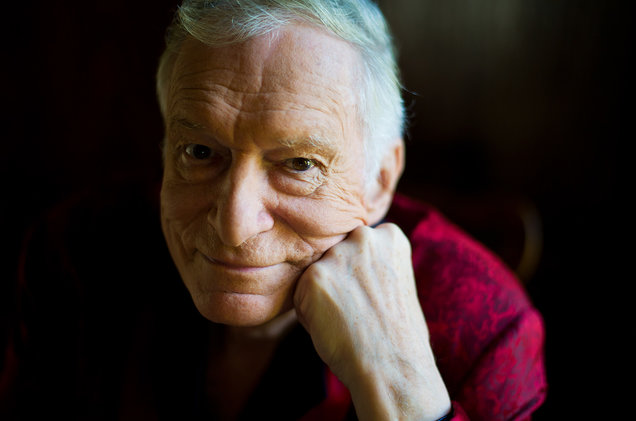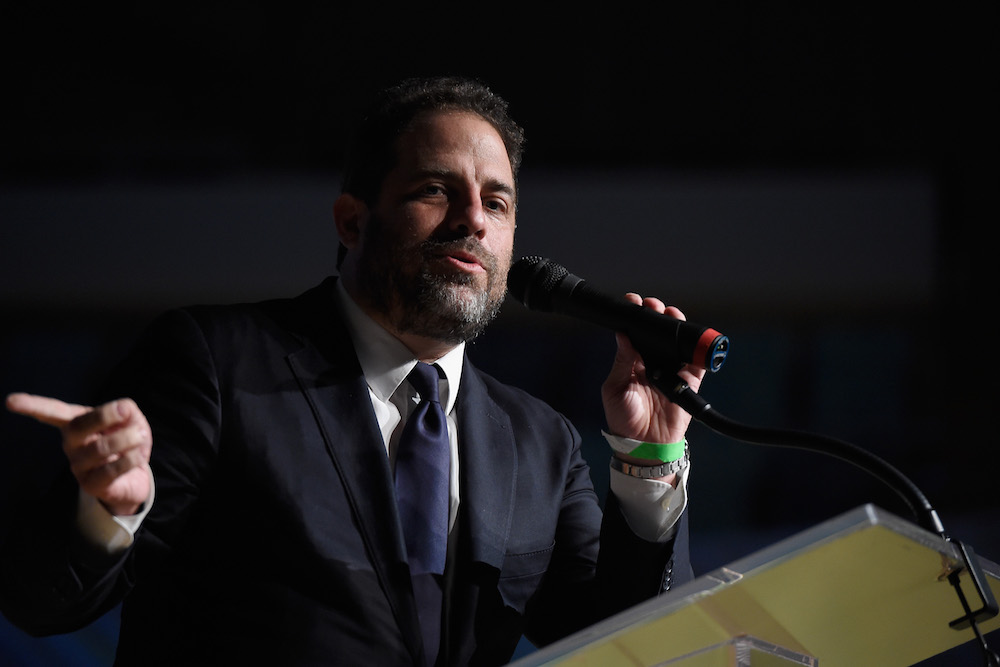Hugh Hefner, who parlayed $8,000 in borrowed money in 1953 to create Playboy, the hot-button media empire renowned for a magazine enriched with naked women and intelligent interviews just as revealing, has died. He was 91.
Playboy confirmed the news in a press release, saying Hefner died in his home at the Playboy Mansion of natural causes on Wednesday.
While most famous for Playboy, the businessman dabbled in all forms of media, including hosting his own TV shows, beginning with Playboy’s Penthouse in the late 1950s and early ’60s. Shot in his hometown of Chicago and syndicated, the show featured Hefner in a tuxedo and smoking a pipe surrounded by “playmates” and interviewing such celebrities as Bob Newhart, Don Adams and Sammy Davis Jr.
The show boosted his personal and professional reputation and promoted what eventually became known as the “Playboy Philosophy,” a lifestyle that included politically liberal sensibilities, nonconformity and, of course, sophisticated parties with expensive accouterments and the ever-present possibility for recreational sex – though Hefner maintained he was a relative late bloomer in that department, remaining a virgin until he was 21.
Hefner followed that show with Playboy After Dark, which had a similar format but with more rock ‘n’ roll, including appearances by The Grateful Dead, Three Dog Night, Harry Nilsson and Linda Ronstadt. The syndicated Screen Gems show was taped at CBS in Los Angeles and ran for 52 episodes in 1969-70.
Hefner also co-produced hundreds of Playboy-branded videos and a few feature films, such as Roman Polanski’s Macbeth and Monty Python’s first film, And Now for Something Completely Different, both released in 1971. He had been a sought-after guest on TV shows as far back as 1969 when he played a Control agent in an episode of Get Smart, and more recently he appeared on Curb Your Enthusiasm, Entourage and Sex and the City as well as in animated shows like The Simpsons and Family Guy.
Hefner also made cameos in several movies, most recently 2008’s The House Bunny, which told the fictional story of a Playboy “bunny,” played by Anna Faris, who has been kicked out of the Playboy Mansion, the famous real-life, 22,000-square-foot house in Los Angeles where Hefner lived for more than four decades and where he hosted famously decadent parties that attracted celebrities A-list through D.
The house sold for $100 million in August with the provision that Hefner be allowed to live there the rest of his life.
Hefner became the unofficial spokesman for the sexual revolution that permeated the 1960s and ’70s and he was both lauded and criticized by feminists of the era, with some accusing him of objectifying women while others said he liberated and empowered them. During a conversation with Gloria Steinem in 1970, Hefner dismissed feminism as “foolishness,” and Steinem told him: “What Playboy doesn’t know about women could fill a book … There are times when a woman reading a Playboy feels a little like a Jew reading a Nazi manual.”
Hefner was a staunch supporter of abortion – including helping to finance the landmark Rowe v. Wade decision in 1973 — and more recently was an outspoken advocate of same-sex marriage, and his dedication to such issues (along with his distribution of pornography) made him a pariah in some religious circles. “By associating sex with sin, we have produced a society so guilt-ridden that it is almost impossible to view the subject objectively,” he wrote in 1963 in one of his many broadsides aimed at Christian leaders.
Hefner also launched the Playboy Channel in 1982, a premium cable outlet that has since been sold and rebranded Playboy TV and is more explicitly sexual than when it was under his purview. He created The Playboy Club nightclub chain that still exists as a novelty, but in its heyday in the 1960s, the era’s biggest stars – including Rat Packers Frank Sinatra and Dean Martin — could be spotted holding court while food and drink were served by the barely dressed bunnies. All this was loosely reflected in the NBC series The Playboy Club, which was set in 1961 and canceled in 2011 after just three episodes aired.
Playboy magazine, though, was Hefner’s bread and butter and his first love. He created it as a young man three years removed from earning a bachelor’s degree in psychology from the University of Illinois at Urbana-Champaign and a few years after quitting a job as a promotional copywriter at Esquire. He borrowed $1,000 from his mom and $7,000 from more than 40 other investors for a publication he was set to call Stag Party until he discovered a magazine called Stag already existed. He purchased a picture of a naked Marilyn Monroe that was taken before she was famous and put it on the cover of his magazine, which he renamed Playboy. The first issue hit newsstands in December 1953.
He didn’t bother putting a date on it because he was doubtful there’d be future issues, but it sold 54,000 copies – 80 percent of the total he had printed — and his largely male audience thirsted for more. The iconic mascot, a silhouette of a bunny in a bow tie, made its debut in the second issue, chosen because Hefner thought rabbits carried “sexual meaning” and were “shy, vivacious, jumping” animals.Through the years, Hefner convinced many Hollywood starlets to reveal more of themselves on his pages than perhaps anywhere else, with Barbra Streisand, Madonna, Mariah Carey, Lindsay Lohan, Kate Moss, Dolly Parton, Sally Field, Joan Collins and Drew Barrymore among the many who warranted in-depth cover stories or Q&As accompanied by sexy pictorials. The “Playboy Interview” launched in 1962 when the magazine hired Alex Haley to interview jazz legend Miles Davis, and subsequent subjects included filmmakers Stanley Kubrick and Woody Allen, actresses Mae West and Bette Davis, civil rights luminaries Dr. Martin Luther King Jr. and Malcolm X, writer-philosopher Ayn Rand and, in 1965, The Beatles.
In a 1971 interview, John Wayne complained about “perverted films” coming from Hollywood and in 1976, presidential candidate Jimmy Carter famously uttered, “I’ve committed adultery in my heart many times.” Through the years, a running joke among men became that they buy Playboy not for the pictures but for the articles, though it rang true because some of the most notable writers in modern history appeared in the magazine, including John Steinbeck, Ray Bradbury, Ian Fleming, Kurt Vonnegut, Norman Mailer and Jack Kerouac.
Playboy Enterprises, the umbrella company Hefner founded in 1953, has fallen on hard times on a few occasions. Long gone is the Big Bunny, the private jet Hefner used decades earlier, and layoffs have plagued the enterprise, which went private in 2011 after years of a declining stock prices. In 2008, it was reported that Hefner had resorted to selling tickets to his famous parties at the Playboy Mansion with the proceeds going to Playboy Enterprises. Hefner’s daughter, Christie, ran the company for more than 20 years but left in 2009.
Read the full obituary on The Hollywood Reporter.





